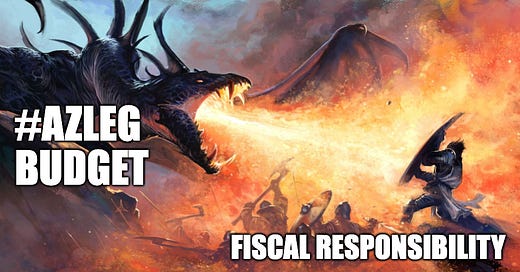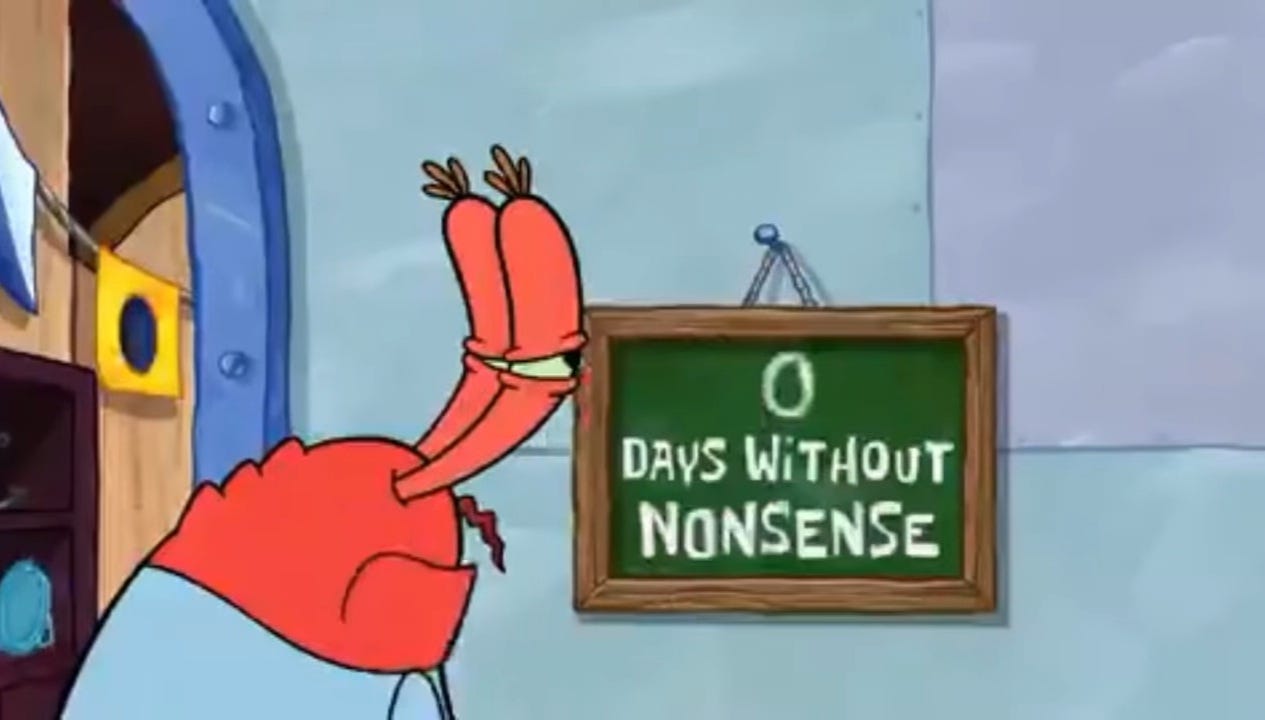CEBV Midweek: May 8, 2023
Budget bills are out. We don't like a lot of what we're seeing. Go use RTS.
As we write this, the Arizona Legislature is recessed so lawmakers can go over budget spreadsheets line by line. CEBV has been doing the same, and much of what we’re seeing horrifies us.
Use RTS as follows:
NO on SB1720 and HB2810. We MUST do something about wasteful, unaccountable universal ESA vouchers this year, as Hobbs promised she would. Otherwise, this budget does not deserve our support.
YES on SB1726 and HB2816. Expanding KidsCare to serve our state’s most vulnerable children is desperately needed and has been a priority for many years.
YES on SB1728 and HB2818. Arizona badly needs these investments in the Housing Trust Fund and homelessness services.
NO on SB1729 and HB2819. Lawmakers are on the right track with extra funding for District Additional Assistance, the poverty weight, and the elimination of “results-based funding” and “freedom school” programs. But we MUST do something about wasteful, unaccountable universal ESA vouchers, this year. Without that provision, this budget does not deserve our support.
NO on SB1734 and HB2824. Say in your comments you oppose the individual income tax rebate. If lawmakers must spend money on this, ask them to remove the requirement that recipients owe a liability, because the rebate should go to people who need it most.
YES on HCR2050. We must waive the AEL school spending cap; a one-year waiver keeps it from becoming a political football this year.
A little good, a lot of bad
To be clear, there are glimmers of good in this budget:
Housing: $140 million for the Housing Trust Fund and $40 million for homeless services (SB1728 / HB2818)
Healthcare: an expansion of eligibility for KidsCare, Arizona’s Medicaid program for children, to 225% of the federal poverty level, about $62,000 for a family of 4 (SB1726 / HB2816)
Infrastructure: $12.5 million for EV infrastructure, most of it for state fleets, and $3.5 million to plan passenger rail between Phoenix and Tucson (SB1722 / HB2812)
K-12 funding: a $20 million bump for District Additional Assistance funding to public schools, which has been so underfunded it literally prompted a lawsuit, and a tiny bump in the poverty weight created last year to help serve our state’s most vulnerable students (SB1729 / HB2819)
Education equity: the elimination of inequitable Ducey-era “results-based funding” and biased university “freedom school” programs (SB1729 / HB2819)
Safety net: a one-year waiver of the AEL school spending cap (SCR1041 / HCR2050)
Many of those were priorities Gov. Hobbs outlined in her January executive budget proposal. They are good things. But they do not negate the toxic clouds of waste, cronyism and grift that permeate this spreadsheet as a whole. If this budget were a person, it would probably have Stage 3 cancer.
$1 billion up in smoke
Let’s start with Arizona’s overall fiscal picture. It’s no secret that, with a surplus that’s projected to completely dry up within the next two years, our state is running out of money. This budget lays that bare. Between a $700 million subtraction for the Ducey “flat tax” and another $260 million for a one-time individual income tax rebate for people with kids, we’re looking at $1 billion, vanished — no longer available to fund the resources and programs our communities actually need. (SB1734 / HB2824)
The one-time individual income tax rebate is $250 for parents with dependents younger than age 17, and $100 for those with dependents ages 17+. It would only apply to people who have at least $1 of tax liability, which would exclude many of Arizona's lowest-income families.
It’s also notable that this budget contains no new ongoing spending (because, with what money?) and, as of next year, there won’t be any surplus either.
“Bribery buckets,” no vision
What this budget lacks most is an overarching vision or purpose. That’s due in large part to the fact that Gov. Hobbs and Republican legislative leadership agreed to give individual “bribery buckets” of $20 and $30 million to each individual Republican lawmaker. And so, rather than presenting a cohesive plan to move Arizona forward, this budget is cluttered with line item after line item of disjointed pork-barrel projects. (SB1722 / HB2812) Got a Democratic lawmaker? Too bad. No roundabout in Payson or repaving project in Morristown for you!


Education gets the shaft
This spreadsheet makes no secret of its plans to defund higher education. It allots a comparative pittance to each of Arizona’s three state universities in one-time operating funding, then strips away ten times that amount the following year.
But lawmakers still managed to cover the biggest slush fund of all: Arizona’s universal ESA voucher program. That’s a $7,000 coupon toward private education for roughly 40,000 children who have never even attended public schools in Arizona. Hundreds of millions of dollars, which were previously not budgeted for at all, are coming out of our current one-time surplus. Majority lawmakers seem to have decided that the problem of how to pay for these vouchers next year (when that surplus money is gone) is a problem for “future Legislature.”

Arizona’s ESA voucher program is the only program in this state that has unfettered, unregulated growth at taxpayer expense. It will cost Arizona taxpayers over $550 million this year alone. At its current rate, the total cost of this unaccountable government subsidy program will surpass $1 billion per year in 2024, with no plan to fund the massive rising cost, at a time when surpluses are projected to dry up. This “alt-schools fiasco” is far outpacing the alt-fuels scandal of 20 years ago; back then, lawmakers rapidly reversed course with far less money up in flames. And despite the fact this program is rapidly spiraling off the rails, this budget makes no attempt to roll back or limit it in any way.

Other holes
Boards. This legislature appears to have it out for the state board of dental examiners and board of massage therapy; a separate bill, which was obviously negotiated as part of the price of budget votes, gives those boards just a 2-year continuation. Even Arizona’s Medicaid program, AHCCCS, which one-third of Arizona citizens rely on for their health care, gets a 6-year continuation — inexplicably short of the 8-year standard. (SB1736 / HB2826)
Fire. The budget sets up a grant program for fire districts, but appears to give them no additional funding. (SB1725 / HB2815)
Building renewal. Several agency needs, including the notoriously underfunded Department of Corrections, are getting as little as 15% of what they need. (SB1722 / HB2812)
Private prisons. We’re spending over $40 million to close the Florence facility and privatize the leftovers, plus $7.1 million per year in ongoing spending to give private prison employees a pay raise. Why exactly? (SB1720 / HB2810)
What’s next?
All of these bills will be discussed and voted on in marathon Appropriations Committee hearings tomorrow (Tuesday). Senate Appropriations meets at 9 AM, and House Appropriations meets at 1 PM.
Hopefully some we’ll see some committee or floor amendments to address the glaring holes; we’ll see.
All bills are scheduled to proceed to caucus (partisan meetings, open to the public, televised only on the House side) and from there to full floor votes. We don’t have ETAs for those caucus and floor calendars yet, but we’ll keep you posted!
Budget Bill Numbers
The links in this section go to fact sheets for individual parts of the budget.
SB1720 / HB2810 - general appropriations act; 2023-2024
SB1721 / HB2811 - amusements; 2023-2024.
SB1722 / HB2812 - capital outlay; appropriations; 2023-2024.
SB1723 / HB2813 - commerce; 2023-2024.
SB1724 / HB2814 - criminal justice; 2023-2024.
SB1725 / HB2815 - environment; 2023-2024.
SB1726 / HB2816 - health care; 2023-2024.
SB1727 / HB2817 - higher education; 2023-2024.
SB1728 / HB2818 - human services; 2023-2024.
SB1729 / HB2819 - K-12 education; 2023-2024.
SB1730 / HB2820 - local government; 2023-2024.
SB1731 / HB2821 - secretary of state; 2023-2024.
SB1732 / HB2822 - state budget implementation; 2023-2024.
SB1733 / HB2823 - state buildings; management; 2023-2024.
SB1734 / HB2824 - taxation; 2023-2024.
SCR1041 / HCR2050 - school districts; expenditure limit; authorization.
2023 Session Timeline
Legislative majority leadership can change bill deadlines at any point. The budget deadline, however, is set in stone because it is tied to the state’s fiscal year.
Friday, 5/12 120th Day of Session (lawmakers' per diem gets cut in half) Friday, 6/30 Last day to pass a budget before the government shuts down
Subscribe. Enter your email address below to have the entire text of these updates emailed to you. (This is driven by Substack, separately from our CEBV emails. Those will still exist: as always, they’ll contain additional information and calls to action, along with a link to the content here.)










